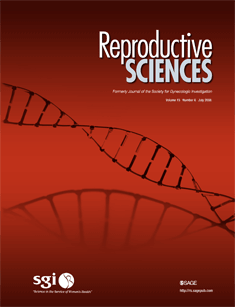
Reproductive Sciences
Scope & Guideline
Exploring the Frontiers of Reproductive Sciences
Introduction
Aims and Scopes
- Reproductive Physiology and Endocrinology:
The journal publishes studies on hormonal regulation, reproductive cycles, and physiological processes involved in reproduction across various species. - Assisted Reproductive Technologies (ART):
Research on ART techniques such as artificial insemination, in vitro fertilization, and embryo transfer, which are critical for improving reproductive outcomes in livestock and endangered species. - Semen Quality and Cryopreservation:
Articles often focus on methodologies to assess and improve semen quality, including the effects of different cryopreservation protocols and extenders on sperm viability. - Impact of Nutrition and Environmental Factors:
The journal addresses how dietary components, environmental stressors, and management practices influence reproductive health and success. - Genetics and Reproductive Performance:
Research on genetic factors affecting reproductive traits, including genetic selection and molecular biology approaches to understand fertility. - Embryonic Development and Maternal-Fetal Interactions:
Studies exploring the early stages of embryonic development, maternal recognition of pregnancy, and factors influencing fetal growth and development. - Comparative Reproductive Biology:
The journal includes comparative studies that highlight reproductive mechanisms across different species, aiding in the understanding of evolutionary adaptations.
Trending and Emerging
- Molecular and Cellular Mechanisms of Reproduction:
There is a growing emphasis on understanding the molecular pathways and cellular interactions that regulate reproductive processes, including gene expression and epigenetic modifications. - Use of Antioxidants in Reproductive Health:
Research exploring the role of antioxidants in improving semen quality and mitigating oxidative stress during reproductive procedures is increasingly popular, indicating a focus on enhancing reproductive outcomes. - Impact of Environmental Stressors:
Studies examining the effects of environmental factors such as heat stress, pollution, and nutritional challenges on reproductive performance are on the rise, reflecting concerns over climate change and animal welfare. - Innovations in Cryopreservation Techniques:
The development of new cryopreservation methods, including the use of novel extenders and additives to improve post-thaw sperm quality, is a trending topic in the journal. - Microbiome Influence on Reproductive Health:
Emerging research is focusing on the role of the microbiome in reproductive health, particularly how microbial communities affect fertility and reproductive success. - Application of Omics Technologies:
The integration of genomics, proteomics, and metabolomics in reproductive research is gaining momentum, facilitating a more comprehensive understanding of reproductive biology.
Declining or Waning
- Traditional Breeding Techniques:
Research focusing on conventional breeding methods has decreased as more emphasis is placed on advanced reproductive technologies and genetic approaches. - Invasive Surgical Techniques:
There has been a noticeable reduction in studies employing invasive surgical methods for reproductive interventions, likely due to the growing preference for non-invasive or less invasive techniques. - Basic Reproductive Anatomy Studies:
The exploration of basic reproductive anatomy has waned, as the field shifts towards more functional and molecular studies that provide insights into mechanisms rather than mere anatomical descriptions. - Studies on Non-Domestic Species:
While still present, research concerning the reproductive science of non-domestic or less commonly studied species has decreased in favor of more commercially relevant livestock and companion animals. - Historical Perspectives on Reproductive Technologies:
There has been a decline in publications that review historical technologies and methods in reproductive science, as the focus shifts towards cutting-edge advancements and current challenges.
Similar Journals

Reproduction and Fertility
Transforming research into impactful health solutions.Reproduction and Fertility is a premier academic journal published by BIOSCIENTIFICA LTD, dedicated to advancing knowledge in the fields of reproductive sciences, obstetrics, gynecology, and related areas. Established with a focus on delivering high-quality research, this journal has quickly ascended in prominence, achieving a commendable Q2 ranking in multiple categories, including Embryology, Obstetrics and Gynecology, Reproductive Medicine, and Urology, as of 2023. With an E-ISSN of 2633-8386, Reproduction and Fertility aims to provide a valuable platform for researchers, professionals, and students alike, offering insights into the latest discoveries and innovations in reproductive health. Although currently not an open-access journal, it remains committed to disseminating important findings that can influence clinical practices and policy-making worldwide. Operating from its headquarters in Bristol, United Kingdom, the journal serves as an essential resource for anyone invested in understanding and improving reproductive health outcomes through rigorous academic research.
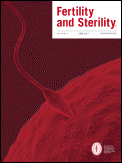
FERTILITY AND STERILITY
Transforming understanding of fertility issues.Fertility and Sterility is a prestigious peer-reviewed journal dedicated to the fields of obstetrics, gynecology, and reproductive medicine. Published by Elsevier Science Inc, this journal has been a cornerstone of scientific discourse since its inception in 1950 and is set to continue its influential coverage of cutting-edge research until 2024. Boasting an impressive impact factor, Fertility and Sterility is ranked among the top-tier journals in its category, holding Q1 status in both Obstetrics and Gynecology and Reproductive Medicine. With Scopus rankings placing it in the 97th and 96th percentiles respectively, the publication serves as a vital resource for researchers, clinicians, and students who seek to advance their understanding of fertility issues and reproductive health. Although it does not currently offer open access options, the journal remains committed to disseminating high-quality research and innovative solutions to the complex challenges in reproduction, empowering professionals and scholars to make meaningful contributions in their fields.

THERIOGENOLOGY
Championing excellence in veterinary science and animal welfare.THERIOGENOLOGY is a prestigious academic journal published by Elsevier Science Inc, dedicated to the field of veterinary reproduction and animal science. With an impressive impact factor and recognized as a Q1 journal in various categories including Animal Science and Zoology, Equine, Food Animals, and Small Animals, THERIOGENOLOGY has established itself as a vital resource for researchers, practitioners, and students alike. Founded in 1974, the journal covers a broad spectrum of topics related to reproductive physiology, biotechnology, and the health management of food and companion animals. Although it does not currently offer open access, researchers can benefit from its comprehensive articles and reviews that push the boundaries of knowledge in veterinary science. With a significant placement in the Scopus rankings, ranking #1 in multiple veterinary categories, THERIOGENOLOGY serves as an essential platform for advancing the understanding of reproductive strategies and practices, thereby contributing directly to the fields of animal husbandry and veterinary medicine.

African Journal of Reproductive Health
Connecting Researchers for a Healthier Tomorrow.African Journal of Reproductive Health, published by the WOMENS HEALTH & ACTION RESEARCH CENTRE, is a vital resource for researchers and practitioners in the fields of obstetrics, gynecology, and reproductive health. This journal, with ISSN 1118-4841 and E-ISSN 2141-3606, has been contributing to the academic discourse since its inception in 1997, offering insightful research and evidence-based articles that address pressing reproductive health issues in Africa and beyond. With a Q3 category ranking in essential areas such as Obstetrics and Gynecology, Public Health, and Reproductive Medicine, the journal is positioned in the 34th to 30th percentile among its peers, reflecting its commitment to high-quality scholarship. Despite its classification as a non-open access journal, the publication remains accessible to a diverse audience, fostering knowledge exchange in reproductive health. The African Journal of Reproductive Health serves as a crucial platform for emerging and established researchers to disseminate their findings, enhancing the understanding of reproductive health challenges and solutions in the African context.

Animal Reproduction
Transforming veterinary science through groundbreaking research.Animal Reproduction is a premier open-access journal published by the Brazilian Coll Animal Reproduction, focusing on the dynamic field of reproductive biology within both veterinary science and animal husbandry. Established in 2004, the journal has rapidly gained prominence, securing a Q2 ranking in both Animal Science and Zoology as well as veterinary disciplines as of 2023. With a growing impact factor and an engaged readership, Animal Reproduction serves as a vital platform for researchers, professionals, and students seeking to disseminate and gain insights into the latest studies and innovations in animal reproductive health and technology. Based in Brazil, the journal's content spans a wide array of topics essential for advancing the scientific understanding of reproduction in animals, thus contributing to improved practices in veterinary medicine and livestock management. The journal is indexed in major databases such as Scopus, ensuring that the research published is accessible to a global audience. Whether you're a seasoned researcher or a student looking to deepen your knowledge, Animal Reproduction is indispensable for anyone engaged in this critical area of study.
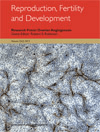
REPRODUCTION FERTILITY AND DEVELOPMENT
Connecting researchers to the latest breakthroughs in fertility and development.Reproduction, Fertility and Development, published by CSIRO Publishing, is a prestigious journal that has been at the forefront of research in the fields of reproductive science, developmental biology, and related disciplines since its inception in 1989. With an ISSN of 1031-3613 and an E-ISSN of 1448-5990, this journal serves as a vital platform for disseminating innovative findings and methodologies that advance our understanding of reproductive processes and development in a variety of organisms. The journal is indexed in prominent databases, exhibiting a solid standing with a Q3 quartile ranking in both Animal Science and Zoology and Biotechnology, and covering 2023 rankings in multiple related categories. Operating from Australia, Reproduction, Fertility and Development embraces a commitment to enriching scholarly communication and fostering collaborative research efforts. Its focus on high-quality, peer-reviewed articles makes it an essential resource for researchers, professionals, and students seeking to stay abreast of the latest advancements and pivotal discussions in reproductive medicine and developmental biology.

Human Reproduction Open
Fostering collaboration for a healthier future.Human Reproduction Open, published by Oxford University Press, is a prestigious open-access journal dedicated to advancing the field of reproductive health and medicine since its inception in 2017. With an E-ISSN of 2399-3529, the journal provides a vital platform for researchers, clinicians, and academics to disseminate innovative findings in obstetrics, gynecology, and reproductive medicine. It is recognized for its impactful contributions, holding an impressive rank of #3 out of 209 in Medicine - Obstetrics and Gynecology, #2 out of 90 in Medicine - Reproductive Medicine, and #1 out of 21 in Medicine - Embryology, placing it in the top percentiles of its respective categories. The open-access model ensures that research is freely accessible, fostering collaboration and knowledge sharing among professionals and students alike. With a commitment to high-quality, peer-reviewed publications, Human Reproduction Open plays a crucial role in shaping the future of reproductive health research and practice, serving as an essential resource for those dedicated to improving outcomes in this dynamic field.

International Journal of Fertility & Sterility
Fostering Collaboration for Fertility SolutionsThe International Journal of Fertility & Sterility, published by ROYAN Institute, is a leading academic platform dedicated to advancing knowledge in the fields of obstetrics, gynecology, and reproductive medicine. With an ISSN of 2008-076X and an E-ISSN of 2008-0778, this Open Access journal has been making significant contributions to the scientific community since its inception in 2007. Based in Tehran, Iran, the journal showcases rigorous research and promotes interdisciplinary collaboration, addressing critical topics related to fertility, sterility, and reproductive health. As of 2023, it holds an impressive Q2 ranking in Obstetrics and Gynecology and a Q3 ranking in Reproductive Medicine, underscoring its relevance and impact in the academic sphere, with Scopus ranks placing it at #67 in Obstetrics and Gynecology and #32 in Reproductive Medicine. The journal's commitment to accessibility and quality is reflected in its global readership, making it an essential resource for researchers, healthcare professionals, and students seeking to enhance their understanding of fertility issues and reproductive technologies.
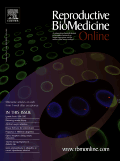
REPRODUCTIVE BIOMEDICINE ONLINE
Innovating solutions for contemporary reproductive challenges.Reproductive Biomedicine Online, published by Elsevier, is a leading peer-reviewed journal that has established itself as a pivotal resource in the fields of Developmental Biology, Obstetrics and Gynecology, and Reproductive Medicine. With an impressive Impact Factor and a Q1 ranking in its respective disciplines as of 2023, this journal provides a platform for innovative research and comprehensive reviews that contribute to advancements in reproductive healthcare. The journal boasts rigorous Scopus rankings, placing it within the top tiers of its categories, which underscores its significance in shaping contemporary biomedical inquiry. Although not open access, it remains widely accessible through institutional subscriptions, making its wealth of knowledge available to researchers, clinicians, and students alike. Since its inception in 2000, Reproductive Biomedicine Online has been committed to fostering a deeper understanding of reproductive processes and biomedicine, ensuring that its content remains relevant and impactful in addressing challenges in reproductive health, thereby championing exceptional scientific discourse.
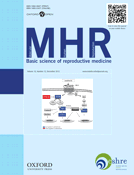
MOLECULAR HUMAN REPRODUCTION
Exploring the Molecular Frontiers of Human ReproductionMOLECULAR HUMAN REPRODUCTION, published by Oxford University Press, is a pivotal journal dedicated to advancing the field of reproductive biology. Since its inception in 1995, the journal has been recognized for its rigorous peer-reviewed research and substantial contributions to the understanding of molecular mechanisms underlying human reproduction. With an impressive impact factor and ranked within the top tiers (Q1 and Q2) across diverse categories including Embryology, Obstetrics and Gynecology, and Reproductive Medicine, it stands as an essential resource for researchers, healthcare professionals, and students alike. The journal aims to publish cutting-edge research that explores the complexities of human reproduction at the molecular and cellular levels, fostering a deeper understanding that can be translated into clinical practice. Although it currently operates under a subscription model, the valuable insights and groundbreaking findings featured within its pages continue to influence the trajectory of reproductive health research globally. Located in the heart of Oxford, United Kingdom, the journal remains committed to addressing vital challenges in the field and promoting innovative scientific dialogue.